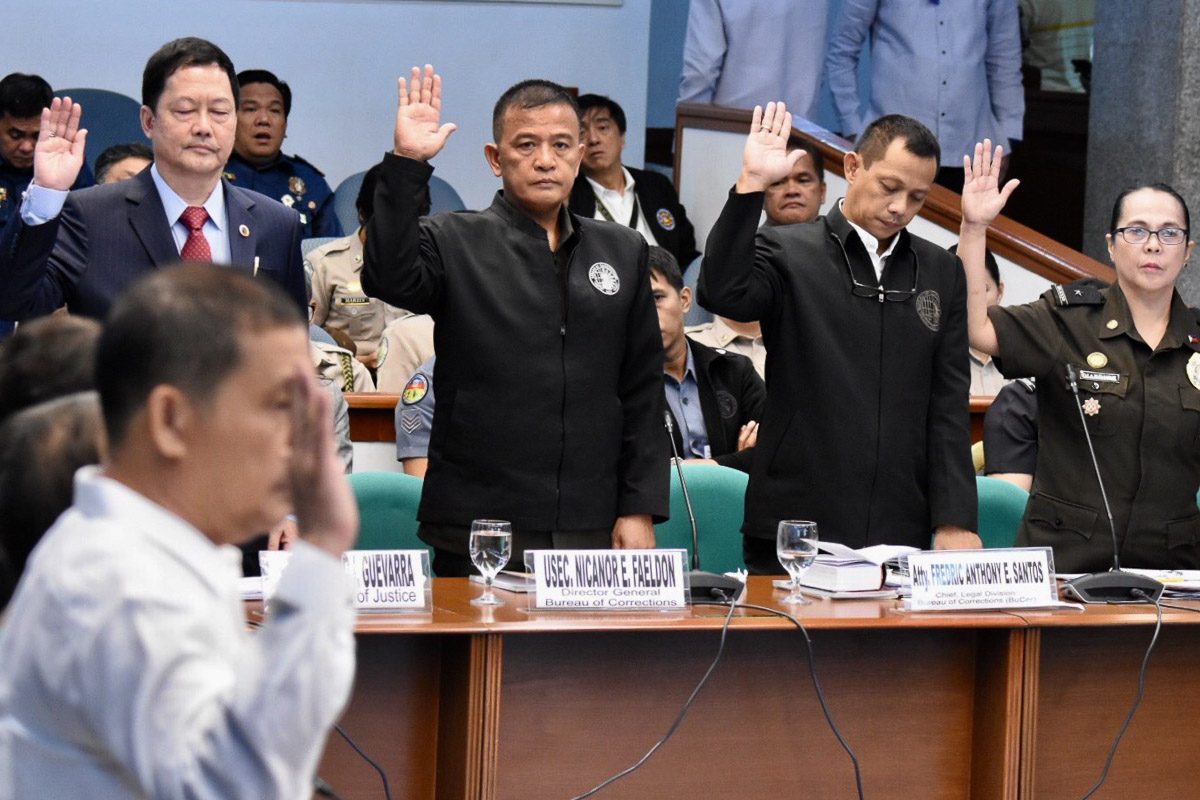SUMMARY
This is AI generated summarization, which may have errors. For context, always refer to the full article.

MANILA, Philippines – The Bureau of Corrections (BuCor) skipped a procedural rule to get prior approval of the Department of Justice (DOJ) for the release orders for convicted Chinese drug lords, the convicts in the Chiong sisters murder case, and rape-slay convict Antonio Sanchez.
Senators learned about this on Thursday, September 5, as Senator Panfilo Lacson grilled BuCor legal chief Fredric Santos on the process of releasing heinous crime convicts at a joint Senate probe into the good conduct time allowance (GCTA) law and the botched release of rape and murder convict Antonio Sanchez. (WATCH: Senate hearing on the GCTA law and Antonio Sanchez)
Under Department of Justice (DOJ) Order (DO) No. 953 signed in November 2015, the justice secretary must be the final approving authority for the release of an inmate sentenced to reclusion perpetua.
Lacson said the release of convicted drug lord Chen Chang on April 8 correctly followed DO 953, but others did not. (READ: Gaps by both Aquino, Duterte administrations led to GCTA mess)
Lacson said that based on the paper trail, BuCor started the process of Chen’s release in 2015. This reached then-justice secretary Vitaliano Aguirre II, followed by Justice Secretary Menardo Guevarra who approved it. Then-BuCor chief Nicanor Faeldon signed the release order for Chen on April 8.
But the same process was not observed in the succeeding releases of high-profile convicts.
The BuCor released 4 more Chinese drug lords in June, 3 convicts in the Chiong sisters murder case on August 16; and supposedly, convicted murderer and rapist Antonio Sanchez on August 20. Except for Sanchez, whose release was recalled because of a public outcry, the process for the rest was completed.
“Alam ‘nyo naman pala ‘yung procedure, kasi ‘yung laging reference DO 953 (You do know the procedure because that’s always the reference, DO 953) but eventually you disregarded it,” Lacson said.
Waived
Santos said they waived the rule but could not point to any official order of anyone revoking DO 953. He said this was done to expedite the release of convicts to avoid legal repercussions.
“Ang problema po kasi, ang dami nang dapat lumaya na hindi makalaya dahil sa [DO] 953 at sobrang tumatagal nag-i-invoke na sila ng arbitrary detention, that’s why decided to pursue the release,” Santos told Lacson.
(The problem is there are so many inmates who are supposed to be released but could not be released because of DO 953 and because of severe delays, they were invoking arbitrary detention that’s why we decided to pursue the release.)
Guevarra, who was at the hearing, told senators that there is no DOJ order that revoked DO 953.
“If it has not been rescinded then it stands,” Lacson said.
What’s the urgency?
Chiong sisters murder convicts Alberto Caño, Ariel Balansag, and Josman Aznar were released based on a memorandum for release signed by BuCor Technical Chief Superintendent Maria Fe Marquez on August 16.
Marquez is the designated signatory for releases on that day because Faeldon was out of town.
Marquez said she was asked by Faeldon’s staff past 4 pm on August 16 to sign the memoranda of releases for 44 convicts, including Caño, Balansag, and Aznar.
“Bakit minamadaling on that day dapat mapirmahan on that day (Why were you rushing that they be signed that day). What’s the urgency? Try to disabuse our minds and justify it,” Lacson said, pointing out that Faeldon could have signed it himself once he returned to Manila.
Both Marquez and Santos explained that the BuCor was wary of possible suits arising from allegations of arbitrary detention, which was why memoranda of releases were always “acted upon promptly.”
Marquez said that some families of convicts even followed them to their homes, as he tried to show the bind they were in following the enactment of the 2013 GCTA law that which opened the door to the early release of thousands of inmates. More are expected to be released after the Supreme Court deemed it retroactive in application.
Lacson said that BuCor must not be afraid of being sued for arbitrary detention, and told Marquez that “the more you talk, the more we suspect you.”
Marquez said the law manual implored BuCor officials to act swiftly on release orders, but Lacson brushed her aside.
“Never mind. We can draw our conclusions from there,” Lacson said.
The Office of the Ombudsman has agreed to launch an investigation into the whole issue, as ordered by President Rodrigo Duterte. The Ombudsman has the power to initiate an investigation without a complaint. – Rappler.com
Read related stories:
- ‘I can sleep soundly,’ Faeldon says after sacking
- Heinous crime convicts still entitled to lesser GCTA – Guevarra
Add a comment
How does this make you feel?
There are no comments yet. Add your comment to start the conversation.